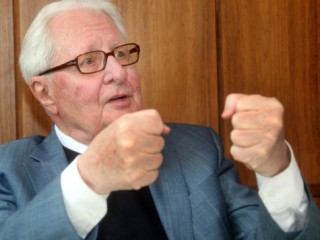
Hans-Jochen Vogel biography
Date of birth : 1926-02-03
Date of death : -
Birthplace : Göttingen, Germany
Nationality : German
Category : Politics
Last modified : 2011-06-07
Credited as : Politician, mayor of Munich , West German Social Democrat
After serving as mayor of Munich for 12 years, Hans-Jochen Vogel (born 1926) became a member of the West German government. In 1983 he led the Social Democratic Party ticket, but lost to the Christian Democrats led by Helmut Kohl. He was chairman of the Social Democrats from 1987 to 1991.
Hans-Jochen Vogel was born on February 3, 1926, in the north German city of Gottingen. He came from a middle-class, politically active family. His father was a university lecturer, and his mother inspired excellence in her sons. His brother Bernhard became the Christian Democratic Party prime minister of the state of Rhineland-Palatinate.
During World War II, Vogel served a mandatory term in the Hitler Youth. He served in the German army in 1943 and was wounded in Italy and taken prisoner. After the war, he studied law and became active in politics. Despite his north German origins, Vogel rose to political prominence in the southern state of Bavaria. After studying at the universities of Marburg and Munich and qualifying for the bar in 1951, Vogel became a member of the Bavarian civil service.
Vogel was typical of young men who came to political prominence in the 1950s and 1960s and steered the SPD away from its Marxist ideas toward becoming a pragmatic and reformist party. Throughout his career, he had a reputation as a master of compromise and a man who was willing to listen to a variety of opinions. Vogel disdained emotional and demagogic appeals and relied on logical persuasion both in intimate settings and in addressing large rallies. For Vogel, Democratic Socialism was essentially a belief in human progress and rationality, in equal opportunity for all members of society and affirmative action for the economically and socially disadvantaged.
Soon after his graduation from college, Vogel, like many West German Social Democrats of his generation, became active in municipal politics. In 1958 he was elected to the Munich city council and two years later was elected mayor of the Bavarian capital. Vogel remained the city's chief executive for the next 12 years, becoming one of the most popular and influential of the big city mayors in the Federal Republic of Germany. His administration was noted for its systematic expansion of Munich's system of urban transport. In 1965, he visited Rome and convinced officials of the International Olympic Committee to designate Munich as the site of the 1972 Summer Olympics. The games provided Vogel with the support needed to undertake a vast urban renewal project.
Vogel's popularity gave him national exposure, and in 1970 he became a member of the Social Democratic Party's national executive board. Despite opposition from the left wing of the SPD, Vogel in 1972 was elected state chairman of the SPD in Bavaria, a state dominated by Franz Joseph Strauss' Christian Democratic Union. In November 1972 he was elected to the federal Bundestag (legislature), and in December was appointed minister of regional planning, housing and urban development in Chancellor Willy Brandt's coalition cabinet of Social Democrats and Free Democrats.
After Brandt's resignation in 1974, Vogel moved to the more important position of minister of justice in the cabinet of Helmut Schmidt. In his seven years as justice minister, Vogel modernized and liberalized the West German judicial code in such areas as abortion rights, divorce law, and sex discrimination. This work helped him make peace with the left wing of his party. Vogel also won praise for his strong actions curbing resurgent Nazi activity and leftist terrorism. By 1980 Vogel was viewed as Schmidt's likely successor as federal chancellor.
In 1981, Vogel was chosen by the SPD's national leadership to clean up an embarrassing scandal in West Berlin. That city's SPD mayor, Dietrich Stobbe, had resigned amid charges of massive graft in his administration. Vogel was elected interim mayor by the SPD-dominated city council, and weeded out many of the corrupt elements in the Berlin SPD organization and in the administration. During his 100 days in office, he tried to make peace with squatters who were protesting the city's severe housing shortage, granting them status as tenants and authorizing $10 million to repair their houses. In June 1981 Vogel and the SPD lost the mayoral and city council elections to the Christian Democrat Union (CDU), but Vogel stayed in West Berlin as opposition leader.
Schmidt's coalition collapsed in 1982, and the Social Democrats no longer had a majority in the Bundestag, which named Christian Democratic leader Helmut Kohl as chancellor. Kohl scheduled federal elections for March 1983. The SPD named Vogel as its candidate for chancellor. Kohl campaigned in support of NATO deployment of Cruise and Pershing II nuclear missiles in West Germany and on a free-market, private-investment platform. Vogel opposed unconditional acceptance of the missiles, took a strong pro-environment stand, and called for higher taxes on the rich and a shorter work week. Vogel lost to Kohl and the CDU, but remained as the party's leader of the opposition in the Bundestag.
Vogel's failure to lead the party to victory in 1983 cost him the SPD nomination for chancellor in the 1987 election. Johannes Rau led the party, but he too went down to defeat at the hands of Kohl. That year, Vogel succeeded Willy Brandt as SPD chairman and remained in that post until 1991, and he gained praise for putting a lid on the party's internal bickering. "A notorious early riser with a punctilious lawyer's mind, he demands hard work and discipline and smartly raps the knuckles of those who get out of line," according to an assessment in The Economist in 1988. But Vogel never again headed the party's national ticket. He remained a member of the Bundestag in the 1990s.
















